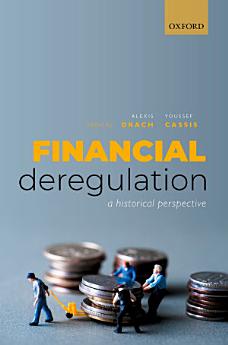Financial Deregulation: A Historical Perspective
Alexis Drach · Youssef Cassis
Mai 2021 · Oxford University Press
E-Book
240
Seiten
family_home
Zulässig
info
reportBewertungen und Rezensionen werden nicht geprüft Weitere Informationen
Über dieses E-Book
A wave of liberalization swept the developed world at end of the twentieth century. From the 1970s and 1980s onwards, most developed countries have passed various measures to liberalize and modernize the financial markets. Each country had its agenda, but most of them have experienced, to a different extent, a change in regulatory regime. This change, often labeled deregulation and associated with the advent of neoliberalism, was sharply contrasting with the previous era of the Bretton Woods system, which has sometimes been portrayed as an era of financial repression. On the other hand, a quick glance at financial regulation today - at the amount of paper it produces, at its complexity, at the number of people involved, and at the resources invested in it - is enough to say that, somehow, there is more regulation today than ever before. In the new system, financial regulation has taken unprecedented importance. As more archival material is becoming available, a better understanding of the fundamental changes in the regulatory environment towards the end of the twentieth century is now possible. What kind of change exactly was deregulation? Did competition between financial regulators lead to a race to the bottom in regulation? Is deregulation responsible for the recurring financial crises which seem to have characterised the international financial system since the 1980s? The movement towards a more liberal regulatory regime was neither linear nor simple. This book - a collection of chapters studying deregulation in various countries and contexts - examines the national and international pathways of deregulation by providing an in-depth analysis of a short but crucial period in a few major countries.
Autoren-Profil
Alexis Drach is Research Associate at Glasgow University. He holds a PhD in history from the European University Institute in Florence. His interests lie in the history of banking regulation and supervision, banks' internationalisation, European integration, globalisation, and expertise. He is part of the project EURECON, 'The Making of a Lopsided Union: European Economic Integration, 1957-1992' funded by a grant from the European Research Council. He studies British and French bankers' positions towards European banking regulation proposals until 1992. Youssef Cassis is Research Professor at the Robert Schuman Centre for Advanced Studies, European University Institute, Florence, and Principal Investigator of the ERC funded research project on 'The Memory of Financial Crises: Financial Actors and Global Risk'. His work mainly focuses on banking and financial history, as well as business history more generally. His most recent books include Crises and Opportunities. The Shaping of Modern Finance (Oxford University Press, 2011), and, with Philip Cottrell, Private Banking in Europe: Rise, Retreat and Resurgence (Oxford University Press, 2015). He has also recently co-edited The Oxford Handbook of Banking and Financial History, (Oxford University Press, 2016, with Richard Grossman and Catherine Schenk).
Dieses E-Book bewerten
Deine Meinung ist gefragt!
Informationen zum Lesen
Smartphones und Tablets
Nachdem du die Google Play Bücher App für Android und iPad/iPhone installiert hast, wird diese automatisch mit deinem Konto synchronisiert, sodass du auch unterwegs online und offline lesen kannst.
Laptops und Computer
Im Webbrowser auf deinem Computer kannst du dir Hörbucher anhören, die du bei Google Play gekauft hast.
E-Reader und andere Geräte
Wenn du Bücher auf E-Ink-Geräten lesen möchtest, beispielsweise auf einem Kobo eReader, lade eine Datei herunter und übertrage sie auf dein Gerät. Eine ausführliche Anleitung zum Übertragen der Dateien auf unterstützte E-Reader findest du in der Hilfe.







